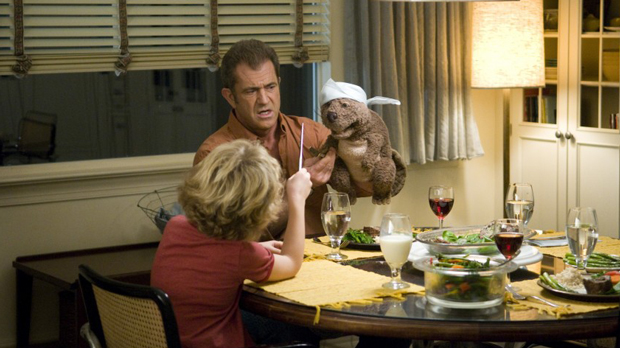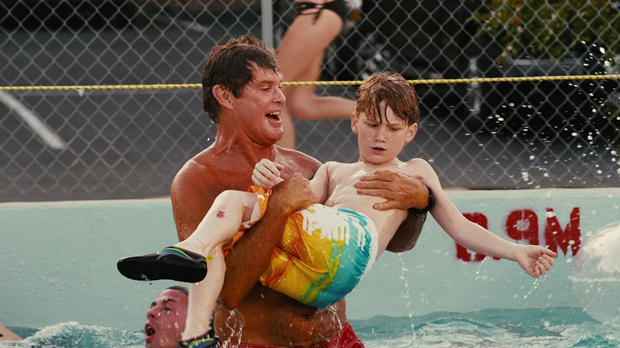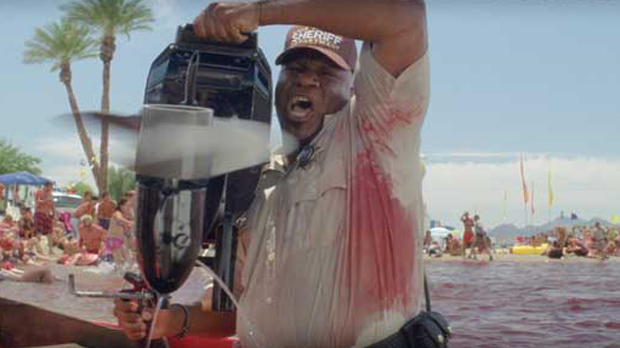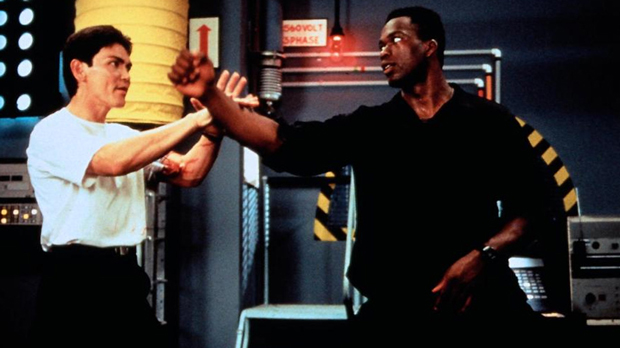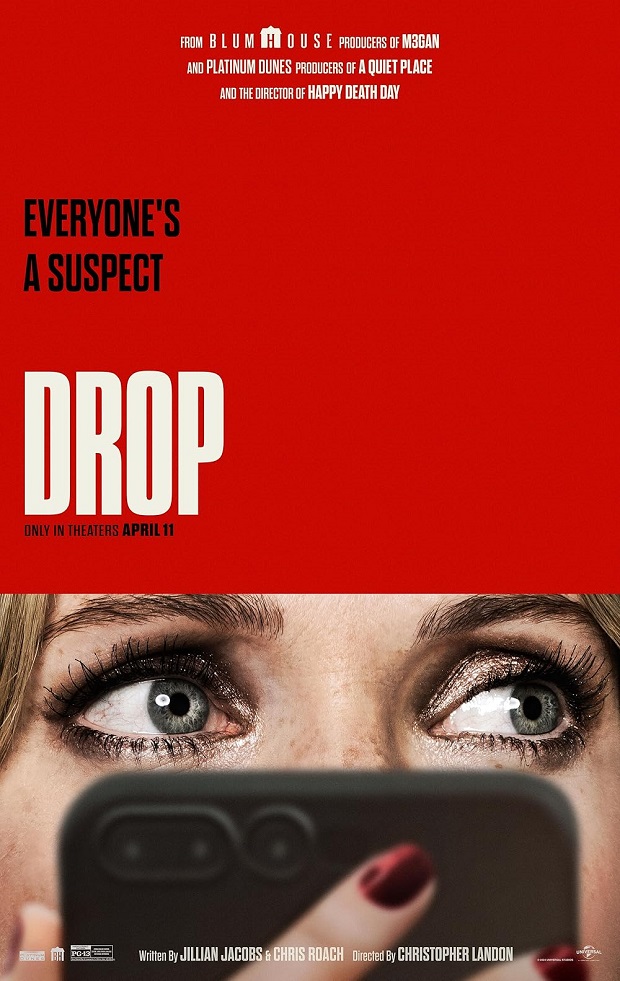 The Beaver (2011) Summit/Drama RT: 91 minutes Rated PG-13 (mature thematic material, some disturbing content, sexuality, language, a drug reference) Director: Jodie Foster Screenplay: Kyle Killen Music: Marcelo Zarvos Cinematography: Hagen Bogdanski Release date: May 11, 2011 (US) Cast: Mel Gibson, Jodie Foster, Anton Yelchin, Riley Thomas Stewart, Jennifer Lawrence, Cherry Jones, Michael Rivera, Zachary Booth, Jeff Corbett, Kelly Coffield Park, Matt Lauer, Jon Stewart. Box Office: $970,816 (US)/$7.2M (World)
The Beaver (2011) Summit/Drama RT: 91 minutes Rated PG-13 (mature thematic material, some disturbing content, sexuality, language, a drug reference) Director: Jodie Foster Screenplay: Kyle Killen Music: Marcelo Zarvos Cinematography: Hagen Bogdanski Release date: May 11, 2011 (US) Cast: Mel Gibson, Jodie Foster, Anton Yelchin, Riley Thomas Stewart, Jennifer Lawrence, Cherry Jones, Michael Rivera, Zachary Booth, Jeff Corbett, Kelly Coffield Park, Matt Lauer, Jon Stewart. Box Office: $970,816 (US)/$7.2M (World)
Rating: *** ½
It’s easy to see why The Beaver was a tough sell for the studio. Contrary to what you might think, it’s not entirely the fault of star Mel Gibson whose bad behavior over the years stripped him of the title of box office king. It used to be his name above the title guaranteed some measure of success. That’s no longer true. He hasn’t had a solo hit since Signs in ’02. But like I said, he’s not the only reason The Beaver bombed at the box office. How do you market a film about a depressive who communicates by way of a beaver hand puppet? It may sound like a light, playful comedy, but it’s not. It’s a serious drama dealing with heavy issues. It’s not likely to go over too well with general audiences at multiplexes. At best, it has limited appeal.
Depression is a subject that’s not always handled well in movies. I still have bad memories of Mr. Jones in which Richard Gere plays a manic depressive in love with his psychiatrist (Lena Olin). It took a serious mental illness and downplayed it by suggesting love conquers all. I know a few things about depression and what that movie proposes is pure fantasy. On the other hand, director Jodie Foster (Little Man Tate) has a good handle on the subject in The Beaver. She elicits a powerful and realistic performance from Gibson whose knack for playing unhinged characters- e.g. Lethal Weapon, Conspiracy Theory- serves him well. He does a first-rate job here.
Gibson plays Walter Black, a family man and CEO of a toy company suffering from crippling depression. It’s bad. Some days he can’t even get out of bed. It affects every facet of his life. He can’t communicate with his family. The stocks in his company are dwindling. His teenage son Porter (Yelchin, Star Trek) resents him to the point where he keeps notes of all his father’s characteristics so he can rid himself of any and all similarities. He doesn’t want to be anything like his dad. His wife Meredith (Foster) can’t take it anymore. She tells him to move out which only makes him spiral further.
While disposing of junk in a dumpster, Walter finds a beaver hand puppet and feels compelled to keep it. It starts to talk to him (in a Cockney accent, no less!) after an alcohol-fuelled suicide attempt in a hotel room. From that point on, “Beaver” takes over for Walter completely. His youngest son Henry (Stewart, The Lucky One) loves it because it brings them closer together. Meredith isn’t sure what to make of it at first, but loves the idea of the old Walter coming back to her. Porter continues to resent his father and stays away as much as possible. He’s a smart kid who makes money writing papers for his classmates. He’s approached by Norah (Lawrence, Winter’s Bone), a pretty, popular girl who wants him to write her valedictorian speech for graduation. Norah has problems of her own and compensates by being the perfect student.
Walter returns to work and turns over leadership to Beaver. Together, they come up with an idea that boosts their profits for the first time in years. He becomes a celebrity after a televised interview with Matt Lauer on The Today Show. It’s a brief period of happiness that ends when his wife suggests he give up Beaver and speak as himself again. It sends him into another downward spiral that leads to him taking drastic action to solve the Beaver problem.
I must commend Gibson for his performance in The Beaver. He plays the role of a deeply depressed man with sensitivity and realism not seen in the OTT antics of LAPD cop Martin Riggs in the Lethal Weapon series. The viewer can literally feel his emotional pain as he struggles to communicate with his loved ones, but finds that he cannot without the beaver puppet. Foster lends great support as the wife whose love knows no end, but patience only goes so far. The late Yelchin gives the performance of his career as the son who’s more like his father than he’s ready to admit. It’s sad to think of the fine actor he would have been (he died in ’16). Lawrence, in a small but significant role, is terrific as a popular girl carrying a heavy emotional burden. You can tell from this early performance she’s destined for great things.
I’ll grant that the idea of man going through life with a beaver puppet on his hand is somewhat absurd. It’s not an easy fit with the central tragedy of a man dealing with mental illness. The Beaver is a little bit bumpy at times, but it’s deeply affecting in showing how depression affects the entire family not just the individual. That’s what a lot of people don’t understand about depression. In fact, a lot of people don’t understand that depression is a disease not a choice. It’s not a simple matter of cheering up and thinking positively. It must be treated by a professional. If you think you have depression or know somebody who has it, the closing credits include a website you can go to for more information. In any event, The Beaver is one of the best movies I’ve seen on the subject.
